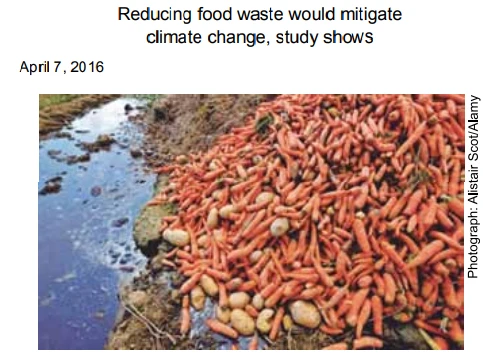Disciplina: Inglês 0 Curtidas
In the last paragraph, according to Jürgen Kropp, a) - UNIFESP 2017

Reducing food waste around the world would help curb emissions of planet-warming gases, lessening some of the impacts of climate change such as more extreme weather and rising seas, scientists said on Thursday.
Up to 14% of emissions from agriculture in 2050 could be avoided by managing food use and distribution better, according to a new study from the Potsdam Institute for Climate Impact Research (PIK). “Agriculture is a major driver of climate change, accounting for more than 20% of overall global greenhouse gas emissions in 2010,” said co-author Prajal Pradhan. “Avoiding food loss and waste would therefore avoid unnecessary greenhouse gas emissions and help mitigate climate change.”
Between 30 and 40% of food produced around the world is never eaten, because it is spoiled after harvest and during transportation, or thrown away by shops and consumers. The share of food wasted is expected to increase drastically if emerging economies like China and India adopt western food habits, including a shift to eating more meat, the researchers warned. Richer countries tend to consume more food than is healthy or simply waste it, they noted.
As poorer countries develop and the world’s population grows, emissions associated with food waste could soar from 0.5 gigatonnes (GT) of carbon dioxide equivalent per year to between 1.9 and 2.5 GT annually by mid-century, showed the study published in the Environmental Science & Technology journal. It is widely argued that cutting food waste and distributing the world’s surplus food where it is needed could help tackle hunger in places that do not have enough – especially given that land to expand farming is limited.
But Jürgen Kropp, another of the study’s co-authors and PIK’s head of climate change and development, told the Thomson Reuters Foundation the potential for food waste curbs to reduce emissions should be given more attention. “It is not a strategy of governments at the moment,” he said.
(www.theguardian.com. Adaptado.)
In the last paragraph, according to Jürgen Kropp,
-
emission reduction should have a separate program.
-
governments should give more attention to food waste to reduce emissions.
-
climate change has a great impact on development.
-
some inadequate strategies could reduce development instead of climate change.
-
governments are worried about food waste.
Solução
Alternativa Correta: B) governments should give more attention to food waste to reduce emissions.
A alternativa B é a resposta correta porque, no último parágrafo, Jürgen Kropp enfatiza que a redução do desperdício de alimentos tem um potencial significativo para diminuir as emissões de gases de efeito estufa, mas que essa abordagem não está sendo suficientemente considerada pelos governos. Ele afirma explicitamente que essa questão "não é uma estratégia dos governos no momento", o que sugere a necessidade de uma maior atenção e um foco mais intenso na gestão do desperdício de alimentos como parte das políticas de combate às emissões.
O texto reforça a ideia de que, enquanto a agricultura é um grande contribuinte para as emissões de gases de efeito estufa, a perda e o desperdício de alimentos representam uma oportunidade não explorada para mitigar as mudanças climáticas. Ao afirmar que "deveria receber mais atenção", Kropp indica que é crucial que os governos reconheçam e integrem a redução do desperdício alimentar em suas estratégias de políticas climáticas, mostrando que há uma ligação clara entre a gestão de alimentos e a redução das emissões.
As outras opções não refletem com precisão o conteúdo do trecho. Por exemplo, a opção A sugere um programa separado para redução de emissões, o que não é mencionado. A opção C aborda o impacto da mudança climática no desenvolvimento, que não é o foco da declaração de Kropp. Portanto, a alternativa B captura corretamente a essência da mensagem, que é a necessidade de mais atenção governamental à questão do desperdício de alimentos como parte das soluções para a redução das emissões.
Institução: UNIFESP
Ano da Prova: 2017
Assuntos: Interpretação Textual em Inglês
Vídeo Sugerido: YouTube